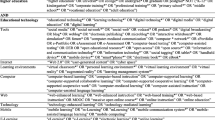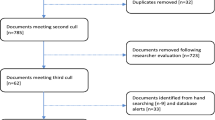Abstract
The provision of quality learning experiences for teachers is critical to mathematics reform agendas aimed at equitable and culturally responsive teaching. In this paper we use an activity theory framework to explore one teacher’s learning journey. Drawing on the teacher’s self-report of his journey 1 year after his participation in an intervention designed to support the introduction of mathematical inquiry practices we examine those factors that supported expansive learning. In seeking to understand our pedagogical stance within the intervention we gained new insights into the provision of research based tools to support learning, the provision of space for individual and collective learning, and the provision of a safe learning environment both within the programme, the class, and the wider professional community. These factors are important in understanding transformational changes associated with ambitious pedagogy.

Similar content being viewed by others
References
Alton-Lee, A. (2011). (Using) evidence for educational improvement. Cambridge Journal of Education, 41(3), 303–329.
Alton-Lee, A., Hunter, R., Pulegatoa-Diggins, C., & Sinnema, C. (2011). Case 1: Developing communities of mathematical inquiry. Quality teaching for diverse (all) learners in schooling. Retrieved from http://www.educationcounts.govt.nz/goto/BES.
Anthony, G., & Walshaw, M. (2007). Effective pedagogy in mathematics: Best evidence synthesis iteration [BES]. Wellington: Ministry of Education.
Anthony, G., & Walshaw, M. (2009). Effective pedagogy in mathematics. No 19 in the International Bureau of Education’s Educational Practices Series. http://www.ibe.unesco.org/en/services/publications/educational-practices.html. Accessed 25 June 2013.
Bourke, R., Mentis, M., & O’Neill, J. (2013). Using activity theory to evaluate a professional learning and development initiative in the use of narrative assessment. Cambridge Journal of Education, 43(1), 35–50.
Bronkhorst, L., Meijer, P., Koster, B., & Vermunt, J. (2011). Fostering meaning-oriented learning and deliberate practice in teacher education. Teaching and Teacher Education, 27, 1120–1130.
Cavanagh, M. (2012). A learning community for pre-service secondary mathematics: Learning with and from each other. In J. Dindyal, L. Cheng, & S. Ng (Eds.), Mathematics education: Expanding horizons (Proceedings of the 35th annual conference of the Mathematics Education Research Group of Australasia) (pp. 63–71). Singapore: MERGA.
Chamberlin, M., & Caygill, R. (2012). Key finding from New Zealand’s participation in the Progress in International Reading Literacy Study (PIRLS) and Trends in International Mathematics and Science Study (TIMSS) in 2010/11. Wellington: Ministry of Education.
Chapman, O., & Heater, B. (2010). Understanding change through a high school mathematics teacher’s journey to inquiry-based teaching. Journal of Mathematics Teacher Education, 13(6), 445–458.
Clarke, D., Clarke, B., & Roche, A. (2011). Building teachers’ expertise in understanding, assessing and developing children’s mathematical thinking: the power of task-based, one-to-one assessment interviews. ZDM - The International Journal on Mathematics Education, 43, 901–913.
Crooks, T., Smith, J., & Flockton, L. (2010). National Education Monitoring Project: Mathematics assessment results 2009. Dunedin: Educational Assessment Research Unit.
Davis, B., & Simmt, E. (2003). Understanding learning systems: Mathematics education and complexity science. Journal for Research in Mathematics Education, 34(2), 137–167.
Ellen, R. F. (1984). Ethnographic research: A guide to general conduct. New York: Academic Press.
Elliot, R., Kazemi, E., Lessieg, K., Mumme, J., Carroll, C., & Kelley-Peterson, M. (2011). Conceptualizing the work of leading mathematical tasks in professional development. Journal of Teacher Education, 60(4), 364–379.
Engeström, Y. (1987). Learning by expanding: An activity-theoretical approach to developmental research. Helsinki: Orienta-Konsultit.
Engeström, Y. (2001). Expansive learning at work: Towards an activity theoretical reconceptualization. Journal of Education and Work, 14(1), 133–156.
Engeström, Y. (2011). From design experiments to formative interventions. Theory & Psychology, 21(5), 598–628.
Engeström, Y., & Kerosuo, H. (2007). From workplace learning to inter-organizational learning and back: The contribution of activity theory. Journal of Workplace Learning, 19, 336–342.
Engeström, Y., & Sannino, A. (2010). Studies of expansive learning: Foundations, findings and future challenges. Educational Research Review, 5(1), 1–24.
Ghousseini, H., & Sleep, L. (2011). Making practice studyable. ZDM - The International Journal on Mathematics Education, 43(1), 1–14.
Graven, M. (2012). Changing the story: Teacher education through re-authoring their narratives. In C. Day (Ed.), The Routledge international handbook of teacher and school development (pp. 127–138). Abingdon: Routledge.
Gresalfi, M., & Cobb, P. (2011). Negotiating identities for mathematics teaching in the context of professional development. Journal for Research in Mathematics Education, 42(3), 270–304.
Hunter, R. (2007). Teachers developing mathematical practices in communities of inquiry. Doctoral thesis, Massey University, Palmerston North, New Zealand.
Hunter, R. (2008). Facilitating communities of mathematical inquiry. In M. Goos, R. Brown, & R. Makar (Eds.), Navigating currents and charting directions (Proceedings of the 31st annual Mathematics Education Research Group of Australasia conference) (pp. 31–39). Brisbane: MERGA.
Hunter, R., & Anthony, G. (2011). Forging mathematical relationships in inquiry-based classrooms with Pasifika students. Journal of Urban Mathematics Education, 4(1), 98–119.
Hunter, R., Anthony, G., Thompson, Z., & Howe, H. (2009). Developing communication and participation patterns in mathematics with diverse learners. In B. Hunter, B. Bicknell, & T. Burgess (Eds.), Crossing divides. (Proceedings of the 32nd annual conference of the Mathematics Education Research Group of Australasia) (p. 747). Palmerston North: MERGA.
Jackson, K., Shahan, E., Gibbons, L., & Cobb, P. (2012). Launching complex tasks. Mathematics Teaching in the Middle School, 18(1), 24–29.
Jaworski, B. (2003). Research practice into/influencing mathematics teaching and learning development: towards a theoretical framework based on co-learning partnerships. Educational Studies in Mathematics, 54(2–3), 249–282.
Kaur, B. (2011). Enhancing the pedagogy of mathematics teachers (EPMT) project: a hybrid model of professional development. ZDM - The International Journal on Mathematics Education, 43(6–7), 791–803.
Kazemi, E., & Franke, M. (2004). Teacher learning in mathematics: Using student work to promote collective inquiry. Journal of Mathematics Teacher Education, 7(3), 203–235.
Lampert, M., Franke, M., Kazemi, E., Ghousseini, H., Turrou, A., Beasley, H., Cunard, A., & Crowe, K. (2013). Keeping it complex: Using rehearsal to support novice teacher learning of ambitious teaching. Journal of Teacher Education, 64(3), 226–243.
Lave, J., & Wenger, E. (1991). Situated learning: Legitimate peripheral participation. Cambridge: Cambridge University Press.
Long, N. (2001). Development sociology: Actor perspectives. London: Routledge.
Maaß, K., & Artigue, M. (2013). Implementation of inquiry-based learning in day-to-day teaching: a synthesis. ZDM - The International Journal on Mathematics Education, 1–17. doi:10.1007/s11858-013-0528-0.
Potari, D. (2013). The relationship of theory and practice in mathematics teacher professional development: an activity theory perspective. ZDM - The International Journal on Mathematics Education, 45(4), 507–519.
Richards, L. (2005). Handling qualitative data: A practical guide. London: Sage Publications.
Rickinson, M., Sebba, J., & Edwards, A. (2011). Improving research through user engagement. New York: Free Press.
Riveros, A., Newton, P., & Burgess, D. (2012). A situated account of teacher agency and learning: Critical reflections on professional learning communities. Canadian Journal of Education/Revue canadienne de l’éducation, 35(1), 202–216.
Roth, W.-M., & Lee, Y. J. (2007). ‘Vygotsky’s neglected legacy’: Cultural-historical activity theory. Review of Educational Research, 2, 186–232.
Roth, W.-M., & Radford, L. (2011). A cultural-historical perspective on mathematics teaching and learning. Rotterdam: Sense Publishers.
Strauss, A., & Corbin, J. (2008). Basics of qualitative research: Techniques and procedures for developing grounded theory (3rd ed.). London: Sage.
Thames, M., & Van Zoest, L. (2013). Building coherence in research on mathematics teacher characteristics by developing practice-based approaches. ZDM - The International Journal on Mathematics Education, 45(4), 583–594.
Timperley, H. (2011a). A background paper to inform the development of a national professional development framework for teacher and school leaders. Melbourne: Australian Institute for Teaching and School Leadership.
Timperley, H. (2011b). Realizing the power of professional learning. Maidenhead: Open University Press.
Timperley, H., Wilson, A., Barrar, H., & Fung, I. (2007). Teacher professional learning and development: Best evidence synthesis Iteration. Wellington: Ministry of Education.
Walshaw, M. (2013). Explorations into pedagogy with mathematics classrooms: Insights from contemporary inquiries. Curriculum Inquiry, 43(1), 71–94.
Wei, R. C., Andree, A., & Darling-Hammond, L. (2009). How nations invest in teachers. Educational Leadership, 66(5), 28–33.
Young-Loveridge, J. (2010). A decade of reform in mathematics education: Results for 2009 and earlier years Findings from the New Zealand Numeracy Development Projects 2009 (pp. 15–35). Wellington: Learning Media.
Zehetmeier, S., & Krainer, K. (2011). Ways of promoting the sustainability of mathematics teachers’ professional development. ZDM - The International Journal on Mathematics Education, 43, 875–887.
Acknowledgments
The authors wish to acknowledge that this project was funded through New Zealand Council of Educational Research Teaching and Learning Research Initiative (TLRI). The authors also wish to sincerely thank Zain Thompson and the other participant teachers in this project who so willingly shared their experiences with the researchers.
Author information
Authors and Affiliations
Corresponding author
Rights and permissions
About this article
Cite this article
Anthony, G., Hunter, R. & Thompson, Z. Expansive learning: lessons from one teacher’s learning journey. ZDM Mathematics Education 46, 279–291 (2014). https://doi.org/10.1007/s11858-013-0553-z
Accepted:
Published:
Issue Date:
DOI: https://doi.org/10.1007/s11858-013-0553-z




